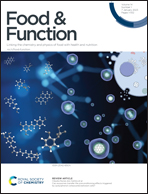Fermented Angelica sinensis activates Nrf2 signaling and modulates the gut microbiota composition and metabolism to attenuate d-gal induced liver aging†
Abstract
Aging is an inevitable physiological process associated with an imbalance in the oxidative defense system. Angelica sinensis, a kind of traditional Chinese medicine (TCM), has anti-oxidant effects and has been considered as a potential supplement in anti-aging treatment. Nevertheless, it has the disadvantages of slow efficacy and long duration of treatment. Fermentation, as an efficient biotechnological approach, is beneficial for improving the nutritional capacity of the material. Fermented TCMs are considered to be more effective. In this study, fermented Angelica sinensis (FAS) and non-fermented Angelica sinensis (NFAS) were used to investigate changes in the chemical constituents. Furthermore, the improvement effect of FAS on D-galactose-induced aging in mice and the potential mechanisms were explored. The results revealed that FAS and NFAS had different constituents under the influence of fermentation, such as 3-phenyllactic acid, L-5-hydroxytryptophan, taxifolin and methyl gallate. These elevated constituents of FAS might help increase the ability of FAS to improve aging. The aging model was established by intraperitoneal injection of D-galactose (2.5 g kg−1 day−1) for 44 days, and FAS (3 g kg−1 day−1) was administered daily by oral gavage after 2 weeks of induction with D-galactose. FAS was observed to significantly ameliorate changes associated with liver aging, such as reduction of MDA, AGEs and 8-OHdG. The contents of pro-inflammatory cytokines containing TNF-α, IL-1β and IL-6 were significantly suppressed in the FAS group. In addition, FAS activated Nrf2 signaling better than NFAS, improved the expression of Nrf2, HO-1, NQO1, GCLC, GCLM and GSS, and further increased the activities of SOD, CAT and other antioxidant enzymes in the liver. Simultaneously, it had a certain repair effect on the liver tissues of mice. The intestinal microbiota analysis showed that FAS could regulate the microbiota imbalance caused by aging, increase the ratio of Firmicutes/Bacteroidetes by 95% and improve the relative abundance of beneficial bacteria related to Nrf2 signaling, such as Lactobacillus. Besides, fecal metabolite analysis identified uric acid as an evidential metabolite, suggesting that FAS participates in purine metabolism to improve aging. Therefore, the regulation of intestinal microbiota and metabolism may be one of the important mechanisms of FAS in alleviating hepatic oxidative stress via the gut–liver axis. The results of this study could provide information for the future development of postbiotic products that may have beneficial effects on the prevention or treatment of aging.



 Please wait while we load your content...
Please wait while we load your content...